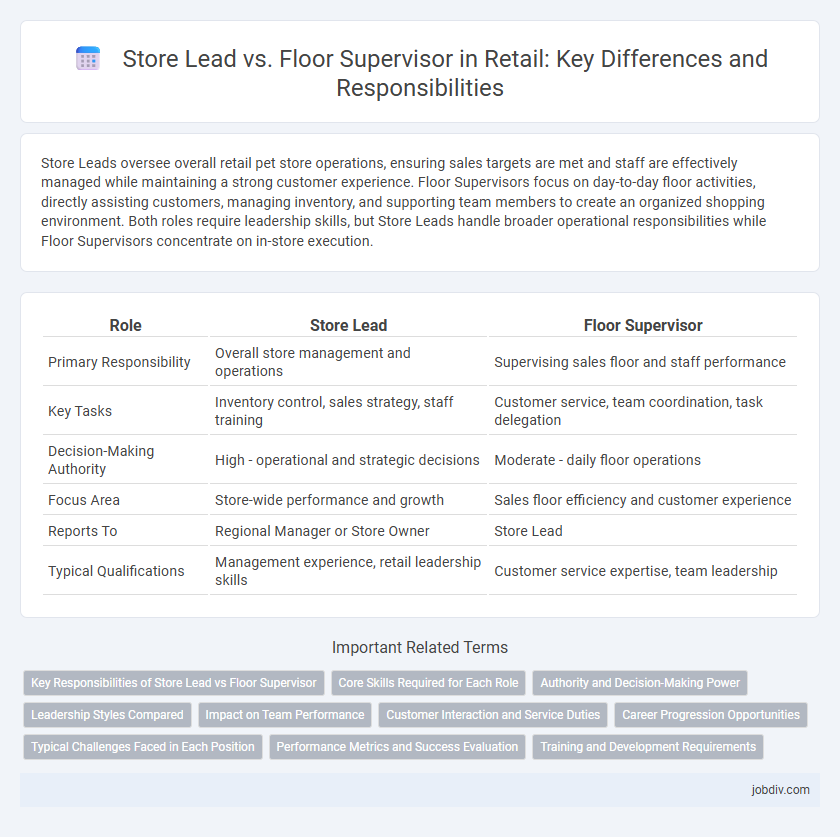Store Leads oversee overall retail pet store operations, ensuring sales targets are met and staff are effectively managed while maintaining a strong customer experience. Floor Supervisors focus on day-to-day floor activities, directly assisting customers, managing inventory, and supporting team members to create an organized shopping environment. Both roles require leadership skills, but Store Leads handle broader operational responsibilities while Floor Supervisors concentrate on in-store execution.
Table of Comparison
| Role | Store Lead | Floor Supervisor |
|---|---|---|
| Primary Responsibility | Overall store management and operations | Supervising sales floor and staff performance |
| Key Tasks | Inventory control, sales strategy, staff training | Customer service, team coordination, task delegation |
| Decision-Making Authority | High - operational and strategic decisions | Moderate - daily floor operations |
| Focus Area | Store-wide performance and growth | Sales floor efficiency and customer experience |
| Reports To | Regional Manager or Store Owner | Store Lead |
| Typical Qualifications | Management experience, retail leadership skills | Customer service expertise, team leadership |
Key Responsibilities of Store Lead vs Floor Supervisor
Store Leads oversee overall store operations, including staff management, inventory control, and sales strategy implementation to ensure business targets are met. Floor Supervisors focus on managing daily floor activities, monitoring customer service quality, and coordinating team tasks to maintain efficient store function. The Store Lead holds a broader leadership role with strategic responsibilities, while the Floor Supervisor emphasizes operational execution and team oversight on the sales floor.
Core Skills Required for Each Role
Store Leads require strong leadership abilities, strategic decision-making, and effective communication to manage overall store operations and team performance. Floor Supervisors need excellent customer service skills, attention to detail, and the ability to motivate frontline staff while ensuring smooth daily floor activities. Both roles demand problem-solving capabilities and a thorough understanding of retail processes, but Store Leads focus more on management strategy while Floor Supervisors emphasize operational execution.
Authority and Decision-Making Power
Store Leads hold greater authority than Floor Supervisors, overseeing entire store operations and making high-level decisions impacting sales, staffing, and inventory management. Floor Supervisors focus on managing daily floor activities, ensuring team productivity and customer service quality with limited decision-making scope. The Store Lead's decision-making power directly influences store strategy, while Floor Supervisors execute operational tasks within established guidelines.
Leadership Styles Compared
Store Leads typically adopt transformational leadership, inspiring teams through vision and motivation, while Floor Supervisors often use transactional leadership, emphasizing task management and performance monitoring. Store Leads prioritize strategic decision-making and team development, fostering innovation and employee engagement. Floor Supervisors focus on daily operational efficiency, ensuring adherence to procedures and immediate problem-solving.
Impact on Team Performance
Store Leads drive overall team performance by setting strategic goals and fostering a results-oriented culture, while Floor Supervisors enhance daily operations through hands-on guidance and real-time problem solving. The Store Lead's focus on leadership development and resource allocation empowers staff to exceed targets, whereas Floor Supervisors ensure consistent execution of sales tactics and customer service standards. Together, their roles create a synergistic effect that improves employee engagement, productivity, and sales outcomes in retail environments.
Customer Interaction and Service Duties
Store Leads oversee overall store operations, driving sales strategies and ensuring high-level customer satisfaction through staff management and conflict resolution. Floor Supervisors focus on direct customer interactions, assisting shoppers with product inquiries, handling checkout processes, and maintaining floor organization for an optimal shopping experience. Both roles prioritize customer service but differ in their scope, with Store Leads managing broader operational duties and Floor Supervisors emphasizing day-to-day customer engagement.
Career Progression Opportunities
Store Leads typically oversee entire store operations, managing staff schedules, inventory, and sales targets, offering a clear pathway to assistant manager and store manager roles. Floor Supervisors focus primarily on daily floor activities, customer service, and team coordination, serving as stepping stones to store lead positions. Career progression from Floor Supervisor to Store Lead enhances leadership skills and operational knowledge, accelerating advancement within retail management.
Typical Challenges Faced in Each Position
Store Leads often face challenges related to overall store performance metrics, such as sales targets, inventory management, and team motivation, requiring strategic decision-making under pressure. Floor Supervisors typically encounter issues with real-time customer service, staff coordination, and immediate problem resolution on the sales floor. Addressing these challenges demands distinct skills: Store Leads emphasize leadership and operational oversight, while Floor Supervisors focus on communication and frontline management.
Performance Metrics and Success Evaluation
Store Leads are primarily evaluated on overall store performance metrics such as sales growth, inventory turnover, and profit margins, ensuring alignment with corporate goals. Floor Supervisors focus on real-time performance indicators including customer service quality, employee productivity, and daily task completion rates. Success evaluation for both roles involves analyzing key performance indicators (KPIs) like conversion rates, average transaction value, and team adherence to operational standards.
Training and Development Requirements
Store Leads require advanced training in leadership, strategic planning, and performance management to effectively guide store operations and drive sales growth. Floor Supervisors focus on hands-on training in customer service, inventory management, and team coordination to ensure smooth daily store functions. Both roles prioritize ongoing development, but Store Leads emphasize decision-making and staff development, while Floor Supervisors concentrate on operational efficiency and frontline team support.
Store Lead vs Floor Supervisor Infographic

 jobdiv.com
jobdiv.com